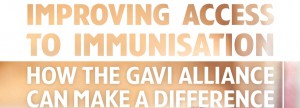This article, written by DSW’s Executive Director Renate Baehr, was originally published at EurActiv yesterday. You can read the original article here.
The issue of vaccinations will take centre stage in Brussels this week. Tomorrow, May 20th, the European Commission will host the GAVI Alliance to discuss its future funding needs as the organisation looks towards expanding its support for investment in vaccination and immunisation under its next five year plan. During this important time, we need EU institutions to honour their international commitments, and their role as the world’s leading development assistance donor, and contribute their fair share to the fight for global health and against child mortality.
Each year, 6.6 million children die before their first birthday – nearly all of these deaths are caused by preventable and treatable diseases. Despite being recognised as among the most innovative and cost-effective public health interventions, 1 in 5 children (19 million children) living mostly in low- and middle-income countries, still do not have access to even the most basic immunisation or vaccination programmes. The tragic result – every 20 seconds a child dies from a preventable disease.
GAVI successes
The GAVI Alliance is a public-private partnership established in 2000, composed of governments, international organisations, private donors, civil society, and the health sector. Since its establishment in 2000, its mission has been to redress global inequities in access to new and underused vaccines. In doing so, it has immunised 400 million children and saved roughly six million lives. GAVI has supported the introduction of vaccinations into over 70 countries which has raised global immunisation rates and accelerated the roll-out of new vaccines. There are enormous knock-on effects for their local communities from these programmes: the disease burden on local health systems is reduced; children are able to fulfil their full potential, finish school and determine their own future; and it improves the opportunities for girls and young women, who are often disproportionally the victims of these diseases.
 Take, for example, cervical cancer. Almost all cases of this are caused by the Human Papillomavirus (HPV) which is responsible for approximately 266,000 deaths every year, of which 85% are women and girls living in low- and middle-income countries. Girls and young women are at a particular risk in these countries because of inadequate health services and a lack of access to cervical screening. Since 2011, GAVI has worked to expand access to HPV vaccines, bringing down the price and supporting roll-out of vaccines in over 20 countries, and is expected to vaccinate 30 million girls by 2020.
Take, for example, cervical cancer. Almost all cases of this are caused by the Human Papillomavirus (HPV) which is responsible for approximately 266,000 deaths every year, of which 85% are women and girls living in low- and middle-income countries. Girls and young women are at a particular risk in these countries because of inadequate health services and a lack of access to cervical screening. Since 2011, GAVI has worked to expand access to HPV vaccines, bringing down the price and supporting roll-out of vaccines in over 20 countries, and is expected to vaccinate 30 million girls by 2020.
EU support lacking
The EU has recently taken a step forward in expanding both the budget and scope for its main instrument aimed at developing innovative responses to global health challenges – the European and developing countries clinical trials partnership (EDCTP). The EU does not, however, match its policy rhetoric with action on the dissemination of the potential new health solutions – its contribution GAVI makes up only 0.7% of GAVI’s total funding.
Enormous progress has been made in rolling out immunisation programmes and addressing health inequalities. However there remains a significant amount of work left if we are to reach the MDG targets for child mortality. That is why, as GAVI reaches the end of one funding cycle and prepares to launch another in Brussels this week, the European Commission and EU member states need to step up and contribute their fair share. This means an increase to €50 million annually between 2015-2019 (via the DCI and EDF) in complementarity with other supports to health system strengthening and other health key issues such as family planning and sexual and reproductive health.
With the deadline of the MDGs fast approaching, and significant progress still to be achieved to reach target on child mortality, the EU has the opportunity this week to stake its claim as a leader on global health. We will be watching with interest.
Renate Baehr, DSW Executive Director
Read more: Improving access to immunisation: how the GAVI Alliance can make a difference

